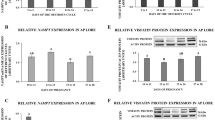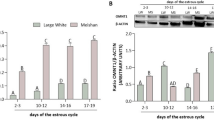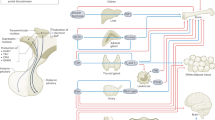Abstract
Ferguson and Wallace1 demonstrated that human pituitary growth hormone supplied by Raben showed the same effect as prolactin on the crop gland of the pigeon. Since I have recently developed a quantitative assay for the luteotrophic activity of prolactin which depends on the prolongation of diœstrus in the mouse it seemed to be worth while investigating human pituitary growth hormone by this technique. The method has already been used to compare different preparations of prolactin2.
This is a preview of subscription content, access via your institution
Access options
Subscribe to this journal
Receive 51 print issues and online access
$199.00 per year
only $3.90 per issue
Buy this article
- Purchase on Springer Link
- Instant access to full article PDF
Prices may be subject to local taxes which are calculated during checkout
Similar content being viewed by others
References
Ferguson, K. A., and Wallace, A. L. C., Nature, 190, 632 (1961).
Kovačić, N., J. Endocrinol. (in the press).
Author information
Authors and Affiliations
Rights and permissions
About this article
Cite this article
KOVAČIĆ, N. Effect of Human Pituitary Growth Hormone on the Length of Diœstrus in the Mouse. Nature 193, 984–985 (1962). https://doi.org/10.1038/193984a0
Issue Date:
DOI: https://doi.org/10.1038/193984a0
This article is cited by
-
Untersuchungen zur Frage der laktotropen Aktivit�t des somatotropen Hormons
Archiv f�r Gyn�kologie (1968)
-
Luteotrophic Activity of Human Growth Hormone (Raben)
Nature (1962)
Comments
By submitting a comment you agree to abide by our Terms and Community Guidelines. If you find something abusive or that does not comply with our terms or guidelines please flag it as inappropriate.



